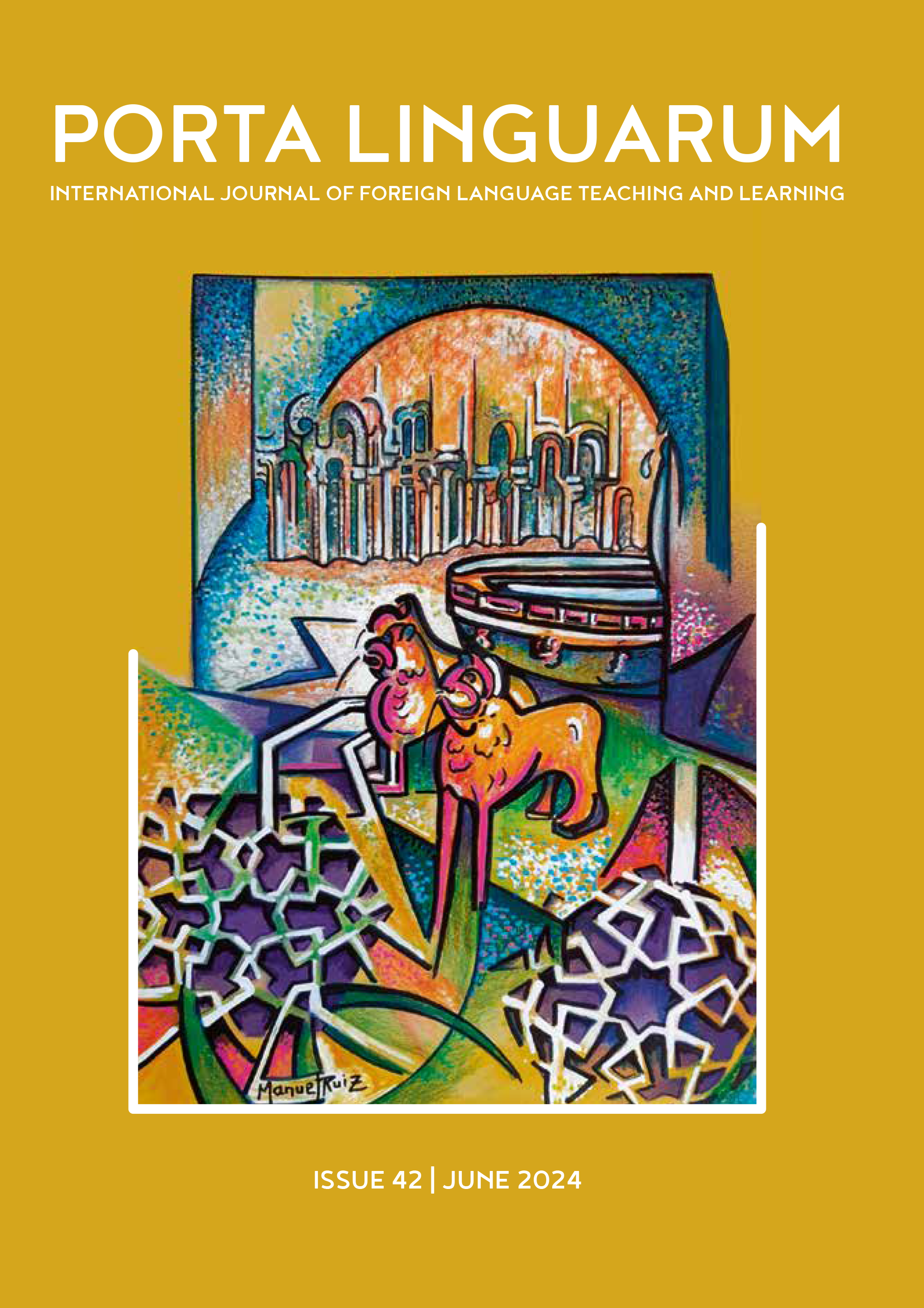La mejora de la comprensión escrita en inglés mediante el aprendizaje basado en proyectos en alumnos del Grado de Educación Infantil
DOI:
https://doi.org/10.30827/portalin.vi42.30164Palabras clave:
aprendizaje basado en proyectos, comprensión escrita estudio cuantitativo, Grado de Educación Infantil, inglésResumen
El presente artículo recoge una investigación llevada a cabo en una universidad pública española con estudiantes del Grado de Educación Infantil durante el pasado curso académico. En el mismo, analizamos el grado de mejora de la comprensión escrita en inglés de los alumnos tras cursar una asignatura en inglés durante un semestre aplicando la metodología del aprendizaje basado en proyectos. Con el propósito de responder al objetivo de esta investigación, se llevó a cabo un estudio cuantitativo mediante la realización de una prueba escrita tanto al inicio (pre) como al final (post) del semestre con el fin de encontrar diferencias en los resultados obtenidos en ambas pruebas mediante la observación directa. La pregunta de investigación que nos planteamos es si se produce mejora en la comprensión escrita de los alumnos tras haber cursado la asignatura en inglés y haber aplicado dicha metodología a la finalización del semestre. Por lo tanto, tras analizar los datos mediante el programa estadístico JASP, los resultados nos muestran una mejora significativa en todas las dimensiones analizadas.
Descargas
Citas
Albarracín Vivo, D., Encabo Fernández, E. & López Valero, A. (2022). Composición escrita del alumnado y expectativas de sus docentes: Una investigación en Educación Primaria. Porta Linguarum, 38, 301-317. DOI: https://doi.org/10.30827/portalin.vi38.23900
Arias, G.J., Holgado, J., Tafur, T. & Vásquez, M. (2022). Metodología de la investigación. Editorial INUDI.
Beltrán, M. (2017). El aprendizaje del idioma inglés como lengua extranjera. Revista Redipe, 6(4), 91-98. DOI: https://doi.org/10.36260/rbr.v6i4.227
Bologna Process (2009). The Bologna Process 2020: The European Higher Education Area in the New Decade. Louvain-la Neuve.
Buenrostro Arceo, R., Martínez Ponce de León, J.G., López Velarde, E.F. & Godínez Dietrich, G. (2023). El aprendizaje basado en proyectos mediante las TIC y su relación con el rendimiento académico en estudiantes universitarios. Revista Relep, Educación y Pedagogía en Latinoamérica, 5(2), 43-55. https://doi.org/10.46990/relep.2023.5.2.1027
Cadena, P., Rendón, R., Aguilar, J., Salinas, E., De la Cruz, F. & Sangerman, D. (2017). Métodos cuantitativos: un acercamiento en las ciencias sociales. Revista Mexicana de Ciencias Agrícolas, 8(7), 1603-1617.
Crespí, P., García-Ramos, J. M., & Queiruga-Dios, M. (2022). Project-Based Learning (PBL) and Its Impact on the Development of Interpersonal Competences in Higher Education. Journal of New Approaches in Educational Research, 11(2), 259-276. https://doi.org/10.7821/naer.2022.7.993
Crespo Fernández, E. (2022). La rúbrica en la evaluación de la competencia didáctica del inglés en el Grado de Maestro. Revista de Docencia Universitaria, 20(2), 145-164. DOI: https://doi.org/10.4995/redu.2022.17369
Fischer, L. & Navarro, A. (1997). Introducción a la investigación de mercados. McGraw-Hill.
Gómez Núñez, M.I., Cano Muñoz, M.A. & Torregrosa, M.S. (2020). Manual para investigar en educación. Ediciones Narcea.
Hernández Sampieri, R., Fernández Collado, C., & Baptista Lucio, P. (2014). Metodología de la investigación. McGraw-Hill.
Imbaquingo, A. & Cárdenas, J. (2023). Project-Based Learning as a Methodology to Improve Reading and Comprehension Skills in the English Language. Education Sciences, 13, 1-19. https://doi.org/10.3390/educsci13060587
Lungu, I. (2022). Project-based Learning as an Efficient Way of Studying English for Specific Purposes. Logos Universality Mentality Education Novelty: Philosophy & Humanistic Sciences, 10(1), 45-52. https://doi.org/10.18662/lumenphs/10.1/63
Marín Marín, A. & Hernández Romero, M.I. (2022). La competencia léxica en inglés de estudiantes universitarios en México. Revista Lengua y Cultura, 4(7), 15-25.
Mendoza Vinces, A.O. & Ramírez Franco, J.M. (2020). Aprendiendo metodología de la investigación. Editorial Grupo Compás.
Núñez Lira, L., Alvarado Guevara, E., Rosales León, T., Alarcón Diaz, M., Alcas Zapata, N. & Luy-Montejo, A. (2020). Teaching Strategies for Text Comprehension of Basic Education Students. Psychology and Education, 57(1), 31-39.
Prado Huarcaya, D.L. & Escalante López, M.E. (2020). Estrategias de aprendizaje y la comprensión de textos escritos del idioma inglés. Investigación Valdizana, 14(3), 140-147. DOI: https://doi.org/10.33554/nr.14.3.730
Puspitasari, I. & Setiawan, K. (2022). Project-Based Learning for English Diploma Program Students: Implementation and Challenges in Online Learning. Teaching of English Language and Literature, 10(2), 151-163. https://doi.org/10.30651/tell.v10i2.14061
Recalde Drouet, E.M., Chicaiza Valle, V.L., Guanga Inca, U.R., Bravo López, Z.M. & Molina Herrera, S.M. (2023). Importancia del Aprendizaje Basado en Proyectos (ABP) para el Aprendizaje Significativo. Ciencia Latina Revista Científica Multidisciplinar, 7(6), 7068-7081. https://doi.org/10.37811/cl_rcm.v7i6.9229
Souza, M., Ferreira, C. & Gomes, R. (2017). Investigación Social: Teoría, método y creatividad. Lugar Editorial.
Torres Zuñiga, L. & Carrasco Flores. J.A. (2020). La enseñanza del inglés en Educación Infantil en España: Implicaciones para la Formación del Profesorado. Docencia e Investigación, 31, 5-23.
Zhang L. & Ma Y. (2023). A study of the impact of project-based learning on student learning effects: a meta-analysis study. Frontiers in Psychology, 14, 1-14. https://doi.org/10.3389/fpsyg.2023.1202728




















